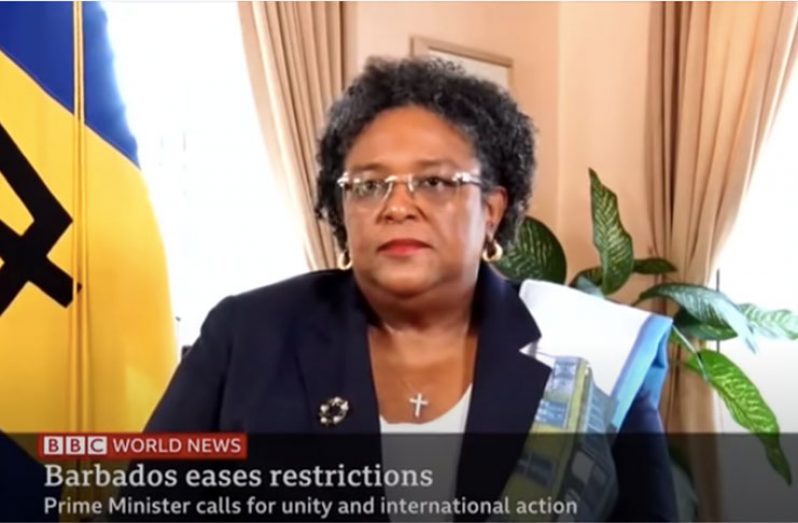— Mottley says regional travel will not be driven by a date
— preparedness, safety comes first
BEFORE CARICOM can re-open regional travel, one of the main matters it must first address is at what stage of travel should COVID-19 tests be presented or administered.
In an interview on Tuesday with the BBC World News, CARICOM Chair and Prime Minister of Barbados Mia Mottley discussed the Region’s greatest difficulty amidst the pandemic: how to balance “lives and livelihoods.”
Approximately 50 per cent of the Region’s Gross Domestic Product (GDP) depends on tourism and trade, but ports have been shut for over two months because of the deadly virus.
DELIBERATIONS ON TESTING
Mottley said that though the Region cannot afford to remain closed forever, and while the hope is that regional travel commences within weeks, CARICOM leaders are not prepared to re-open without being prepared.
“We’re not going to be driven by a date; we’re going to be driven by protocols that make us safe because we want to remain safe for our people; we want to remain safe for the people who are visiting us,” Mottley made clear to BBC host Matthew Amroliwala.
She said that discussions are in progress with the airline and cruise industries to ensure that necessary protocols are the key concern surrounding COVID-19 testing.
“I think the airlines have been doing a reasonably good job in trying to ensure that the planes can be kept sanitized, certainly far more than they have been, but the big issue is testing,” she said.
“[Will we be] testing before people get on the planes or testing when people arrive. Quite frankly, it’s more practical before people leave and we need access to rapid tests or tests protocols that will allow us to be able to determine what is the risk that we are going to take: is a person is tested 24 hours before, or should the person be tested within a matter of hours before going to check in?”
SAFETY ABOVE ALL
However, this raises the matter of how do CARICOM countries intend to deal with the possible importation of more cases of the virus. Amroliwala also asked Mottley whether CARICOM countries would be accepting tourists from high-infected countries and what provisions are in place for possible outbreaks at tourism facilities.
The prime minister said that such concerns are the main reasons that regional leaders are still in “deep conversation” about the development of a common public health protocol.
This developed protocol would result in the adoption of best practices which will fight COVID-19 specifically in the Region; pooled efforts for the procurement of medical devices and supplies and similar techniques when it comes to COVID-19 preventative measures during travel.
She added that until these matters can be ironed out with all stakeholders, CARICOM cannot work towards a date, but towards preparedness.
Mottley said: “The individual countries are going to make sure that we touch all the bases because it is not our intention to import; it is not our intention to have anyone be affected, but at the same time we have to balance the reality that the Caribbean is among the most travelled if not the most travelled and trade-dependent Region in the world.”
WE HAVE TO ACT
Wishing the current challenges away is simply futile. The CARICOM Chair said that the Region has to act quickly and carefully to turn around unemployment rates which have tripled in some countries.
For the month of April, she said that between 40-60 per cent of government revenues in tourism-dependent countries have been affected. Though all other parts of the world have also been affected, Mottley said that the difference is that the Region has a much narrower base from which it gains its revenues.
She said that the only positive is that tourism businesses are able to use the down time for renovation and training. Even so, she reminded viewers that the Region is about to enter the hurricane season and is in the middle of a climate crisis affecting Caribbean countries with droughts and excessive sargassum weed.
The CARICOM Chair used the forum to iterate her calls for global leadership which would consider all countries for their advantages and disadvantages, thereby providing those most in need with better access to assistance.
“You have to govern for tomorrow and if you only govern for today, then you will undermine the very ground on which you stand for tomorrow. We have to be sensible enough to know that we’re in this for the long haul,” she said.




.png)









